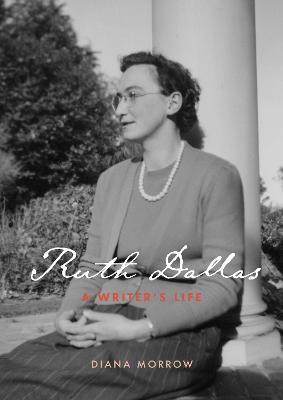Review: Ruth Dallas: A Writer's Life, by Diana Morrow
'...her poetry was notable for its clarity, refinement, economy and engagement with the landscape of Southland and Otago. It was sometimes dismissed as too regional, too sentimental and – often in the subtext of a criticism – feminine.'
It's strange and perhaps even shameful that it's difficult to find Ruth Dallas' acclaimed poetry collections in bookshops, work of which Landfall's founding editor Charles Brasch said in 1961, 'no other poems written in this country move me and haunt me as Ruth's do. There is larger, more commanding poetry, but there is none finer than hers'.
Dallas was praised occasionally by James K. Baxter, often by Allen Curnow, was friends with C.K. Stead, R.A.K. Mason and many others. Her work over many decades was most often reviewed favourably and she had a long friendship with Janet Frame. In 1978 she and Frame – sometimes near neighbours, although writing was rarely a topic of conversation – received their honorary doctorates in literature from the University of Otago together.
Dallas was also an acclaimed author of children's novels and stories; wrote and read popular stories for radio; her poetry was set to music by Douglas Lilburn, Anthony Ritchie and Gillian Whitehead; and in 1989 she was awarded the CBE for services to literature. But her extensive catalogue – poetry from 1953 to 2006 – is out of print and therefore absent from shelves.
That will be rectified by the simultaneous publication of This Moment, Every Moment, a new poetry collection edited by Nicola Cummins of the University of Otago*, and this refreshingly clear-eyed, thorough and very readable biography by historian Diana Morrow.
Dallas was born Ruth Mumford in 1919 and had her name changed at the suggestion of Southland Times editor Monte Holcroft because her given name on poems she submitted was incongruous 'at the end of so much music'. She adopted her grandmother's surname.
Dallas was the third daughter of entrepreneurial parents in Invercargill and discovered poetry through a school teacher at age eight. Enchanted by words and rhythms, she began to write, contributing prose and poetry to the Little Pakehas children's page in the Southland Daily News. She would later observe, 'I am at a loss to account for the fact that I wrote poetry in an environment where I knew no-one who was interested in poetry'. Throughout her long life – she died in 2008 age 88 -- her poetry was notable for its clarity, refinement, economy and engagement with the landscape of Southland and Otago. It was sometimes dismissed as too regional, too sentimental and – often in the subtext of a criticism – feminine. But her imagery was direct, distilled and focused, so it was perhaps inevitable she gravitated to ancient Chinese poets, Buddhism and philosophies which emphasised quiet clarity and a relationship with nature.
'Life is short,' she once said, 'and no-one has time to ponder over a poem it takes ages to unravel.'
Equally inevitable was the factionalism which emerged within educated poetry circles (she'd left school at 16 as many did at the time). Over the decades some dismissed Dallas' work as not evolving and disconnected from the wider world. Often solitary by choice, she never married and rarely traveled beyond the lower South Island. But her mind was sharp and she was intellectually and emotionally comfortable in her southern landscapes when urban poets, predominantly male, were grappling with colonial guilt, contemporary life and internationalism.
In her years working at Landfall with Brasch she was an astute reviewer and would edit to refine the work in front of her.
Certainly her children's books – none in print since the 1980s – have dated and Morrow notes 'her historical fiction accords with a mid-century progressivist view of settler life' and was superseded by critiques of colonialism, the Māori renaissance and discomfort with the realism she portrayed, such as the father whipping his son's legs with a leather belt in A Dog Called Wig.
Ruth Dallas was a singular talent, her poetry rightly celebrated and she a more complex woman than the bare facts of her seemingly insular life would suggest. Diana Morrow – drawing on letters, reviews, essays, Dallas' own autobiography and interviews – gives a deep and well-rounded biography of the woman and the writer who lived a rich inner life and could craft simple yet resonant lines:
Words break out of us; We are made of words, as leaves Make sheltering trees. * This Moment, Every Moment; Ruth Dallas, Collected Poems edited by Nicola Cummins. Otago University Press. 9781991348098. RRP $50
